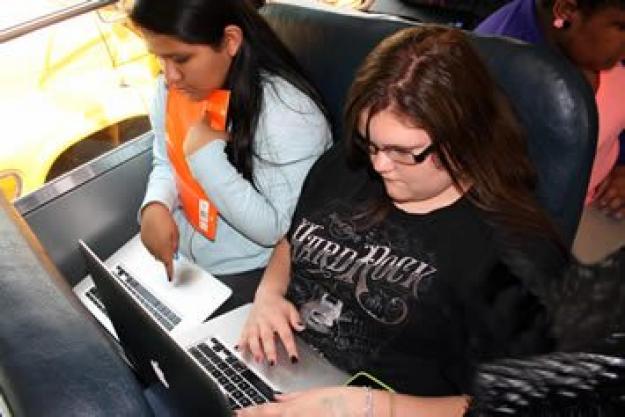North Carolina middle school steers Wi-Fi onto buses

A North Carolina middle school has created “rolling study halls” by adding Wi-Fi, teachers and about 100 devices to nine school buses.
Google and The Education Foundation of Caldwell County funded the pilot program for Gamewell Middle School, which serves 530 students, with a $60,000 grant.
The new cutting-edge features allow students to do homework, conduct research and receive additional tutoring and technical support on the way to and from school. The program is one of the first of its kind in North Carolina, according to school officials.
“We have excellent sponsors who have given us the ability to not only provide students with access to the internet and enrichment, but also to provide teachers with additional employment,” Steve Stone, superintendent of Caldwell County Schools, said in an interview with EdScoop.
Accompanying the students is one teacher per bus in the afternoon, to help them with their work and assist with technical difficulties. The buses are also equipped with cameras, providing a livestream feed directly to the school’s administrators. Officials say the additional monitors have nipped poor behavior.
“Discipline on the school bus has improved significantly,” said Monica Martin, Gamewell Middle Assistant Principal. “With more time on task coupled with the monitoring feature of the cameras, we’ve had fewer discipline problems from students. It has become an extra security measure for the drivers as well.”
The middle school has allocated 75 refurbished Macbooks for students to use both in and out of school, as well as 30 Chromebooks during their hour to hour-and-a-half long commute.
Caldwell County, located by the Blue Ridge Mountains, is affected by what some advocates call the digital divide or the homework gap, especially in its rural communities. For some students, internet is only accessible in school, Stone said.
“Gamewell struggles with high poverty and little funding to support technology,” said Stone, “so I appreciate that we have the opportunity to give kids access to all the opportunities that Wi-Fi can provide and help close the digital divide.”
Stone said the program, which began in January and is wrapping up its pilot phase, has shown a significant measure of success. The Wi-Fi on board is highly controlled with filters to ensure that students are accessing safe, educational websites.
The superintendent plans to apply for more grants to fund additional technology programs like this in the fall. He hopes to gradually expand the program to the remaining 25 schools in Caldwell County.
“We want to reach our outlier schools in rural communities first, because a good number of our kids don’t have access to Wi-Fi,” said Stone. “We want to stop this inequity of internet access in our community.”
Reach the reporter at darlene.aderoju@edscoop.com and follow her on Twitter @buuukky.




